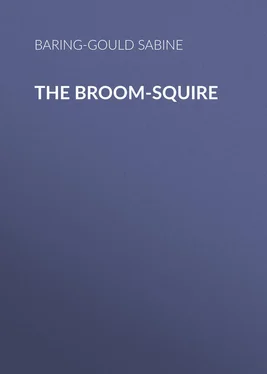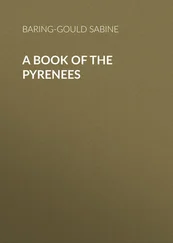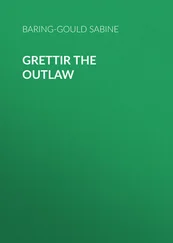Sabine Baring-Gould - The Broom-Squire
Здесь есть возможность читать онлайн «Sabine Baring-Gould - The Broom-Squire» — ознакомительный отрывок электронной книги совершенно бесплатно, а после прочтения отрывка купить полную версию. В некоторых случаях можно слушать аудио, скачать через торрент в формате fb2 и присутствует краткое содержание. ISBN: , Жанр: foreign_antique, foreign_prose, на английском языке. Описание произведения, (предисловие) а так же отзывы посетителей доступны на портале библиотеки ЛибКат.
- Название:The Broom-Squire
- Автор:
- Жанр:
- Год:неизвестен
- ISBN:http://www.gutenberg.org/ebooks/30354
- Рейтинг книги:3 / 5. Голосов: 1
-
Избранное:Добавить в избранное
- Отзывы:
-
Ваша оценка:
- 60
- 1
- 2
- 3
- 4
- 5
The Broom-Squire: краткое содержание, описание и аннотация
Предлагаем к чтению аннотацию, описание, краткое содержание или предисловие (зависит от того, что написал сам автор книги «The Broom-Squire»). Если вы не нашли необходимую информацию о книге — напишите в комментариях, мы постараемся отыскать её.
The Broom-Squire — читать онлайн ознакомительный отрывок
Ниже представлен текст книги, разбитый по страницам. Система сохранения места последней прочитанной страницы, позволяет с удобством читать онлайн бесплатно книгу «The Broom-Squire», без необходимости каждый раз заново искать на чём Вы остановились. Поставьте закладку, и сможете в любой момент перейти на страницу, на которой закончили чтение.
Интервал:
Закладка:
The landlord, proprietor of the Ship and of Mrs. Susanna Verstage, was a dull, obstinate man, slow of thought and of speech, withal kindly. Like many another dull man, if he did a stupid thing he stuck to it; and the stupider the thing done, the greater the tenacity with which he held to the consequences. His mind was chiefly occupied with a small farm acquired out of the sand waste, hedged about, dressed and cultivated, and increasing annually in value. In this was his interest and pride; he cared nothing for the tavern, save as an adjunct to the farm. All his energies were devoted to the latter, and he allowed his wife to rule supreme in the inn. Simon Verstage was a well-to-do man. He must have managed very ill had he not made a farm answer for which he paid no rent, save an acknowledgment of 6d. an acre to the lord of the manor. He held the land on a head rent upon the lives of himself, his wife, and his son. The public-house, well frequented by wayfarers, and in good repute among the villagers, supplemented the profits made out of the farm in good years, and made up for deficit in such years as rain and deficiency in sun made bad agriculturally.
The inn stood at a junction of roads, or rather where two lanes fell into the main London and Portsmouth road. It sometimes went in consequence by the name of The Lane End Inn. In situation it was fairly sheltered, a hillock of sand rock sheltered it on the east from the bitter winds that swept the waste between Milford and Thursley, and a growth of huge hollies was its protection against the equally cold blasts from the north.
So long as Iver was a small boy, his father employed him about the farm, to assist him in ploughing, to hoe potatoes, and wield the muck-fork in the cow-house, or, to use the local term, the cow-stall. He kept the lad hard at work from morning rise till set of day.
Iver endured this, not entering with interest and pleasure into the work of the farm. He had no perception of the points of a bullock, and he had a prejudice in favor of ragged hedges.
Iver's neglect of duties, and forgetfulness of what was told him, called forth reprimand and provoked chastisement. They were not due to wilfulness or frivolity, but to preoccupation of the mind. The boy had no natural taste for the labors of the field. He disliked them; for everything else he had eyes, save for that which pertained to the tasks imposed on him.
Throughout early boyhood this lack of interest and inattention had caused much friction, and this friction became aggravated as he grew older, and his natural bent became more marked.
It would be hard to find in one family two persons so utterly dissimilar as Iver and his father. They seemed to have diverse faculties seated in their several organs. They neither saw, heard, nor smelt in the same manner, or rather saw, heard, and smelt so differently as to feel in distinct fashion. What pleased the one was distasteful to the other.
It was not possible for Iver to open his mind to his father, because his father could not understand and appreciate his thoughts.
But if his heart was sealed to Simon Verstage, it was open to his mother, who loved and spoiled him, and took his part invariably, whether the boy were in the right or wrong. In every way possible she humored his fancies; and she, unwisely, condoled with him on what she was pleased to consider as his father's injustice. At length there ensued a rupture so wide, so aggravated by mutual recrimination, that Mrs. Verstage doubted her ability to bridge it over.
This breach was occasioned by Iver one morning climbing to the sign-board and repainting the stern of the vessel, which had long irritated his eye because, whereas the ship was represented sideways, the stern was painted without any attempt at fore-shortening; in fact, full front, if such a term can be applied to a stern.
The laws of perspective were outraged in the original painting; of such laws Iver knew nothing. What he did know was that the picture was wrong. His eye, his natural instinct told him so. The matter had been for long one of controversy between himself and his father. The latter had been unable to understand that if the portholes at the side were visible, the entire stern could not possibly be viewed in full.
"She's got a stern, ain't she?" asked the old man. "If she has, then wot's we to deny it her?"
At length Iver cut the controversy short, and brought the quarrel to a crisis by climbing a ladder with a brush and some paints obtained from the village carpenter, during the temporary absence of his father, and putting the foreshortening to rights to the best of his ability.
When the old man was aware what his son had done on his return from Godalming, whither he had betaken himself to a fair, then he was furious. He stormed at Iver for daring to disfigure the sign-board, and at his wife for suffering him to do it unreproved.
Iver turned stubborn and sulky. He muttered an answer, lacking in that respect due to a parent. The old man became abusive.
Mrs. Verstage intervened ineffectually; and when night arrived the youth made a bundle of his clothes and left the house, with the resolve not to return to it so long as his father lived.
Whither he had gone, for a long time was unknown. His mother wept, so did Mehetabel. The old man put on an assumption of indifference, was short and ungracious to his wife. He was constrained to engage a man to do the farm work hitherto imposed upon Iver, and this further tended to embitter him against his rebellious son. He resented having to expend money when for so long he had enjoyed the work of Iver free of cost.
The boy's pride prevented him from writing home till he had secured himself a position in which he could maintain himself. When he did communicate with Thursley, it was through Mehetabel, because Simon had forbidden any allusion to the truant boy, and Mrs. Verstage was not herself much of a scholar, and did not desire unnecessarily to anger her husband by having letters in his handwriting come to her by the post.
Years passed, during which the landlady's heart ached for her son: and as she might not speak of him to Simon, she made a confidant of Mehetabel.
Thus, the old woman and the girl were drawn closer together, and Mehetabel glowed with the thought that she was loved by the hostess as though she were her own daughter.
To talk about the absent one was the great solace of Susanna Verstage's life. There ever gnawed at her heart the worm of bereavement from the child in whom her best affections, her highest pride, her sole ambitions were placed. It may be questioned whether, without the sympathetic ear and heart of Mehetabel into which to pour her troubles and to which to confide her hopes, the woman would not have deteriorated into a hard-hearted virago.
Her love to Simon, never very hot, had dried up. He had wounded her to the quick in unpardonable fashion in driving her only child out of the house, and all for the sake of a two-penny-ha'penny signboard.
Throughout her work she schemed, she thought for Iver; she toiled and endured in the tavern only to amass a competence for him. She clung to the place only because she trusted some day he would return to it, and because every corner was sweet with recollections of him.
When not at work she dreamed, waking or sleeping, and all her dreams were of him. She built castles in the air – all occupied by him. She had but one hope: to meet her son again. All her activities, all her thoughts, all her aspirations, all her prayers were so many lines focussing on one point, and that her son. To Mehetabel she told her mind, and Mehetabel shared all her hopes; the heart of the girl beat in entire sympathy with that of the hostess. Iver's letters were read and re-read, commented on, and a thousand things read into them by the love of the mother that were not, and could not be there. These letters were ever in the girl's bosom, kept there to be out of reach of old Simon, and to be accessible at all moments to the hungering mother. They heard that Iver had taken to painting, and that he was progressing in his profession; that he gave lessons and sold pictures.
Читать дальшеИнтервал:
Закладка:
Похожие книги на «The Broom-Squire»
Представляем Вашему вниманию похожие книги на «The Broom-Squire» списком для выбора. Мы отобрали схожую по названию и смыслу литературу в надежде предоставить читателям больше вариантов отыскать новые, интересные, ещё непрочитанные произведения.
Обсуждение, отзывы о книге «The Broom-Squire» и просто собственные мнения читателей. Оставьте ваши комментарии, напишите, что Вы думаете о произведении, его смысле или главных героях. Укажите что конкретно понравилось, а что нет, и почему Вы так считаете.












